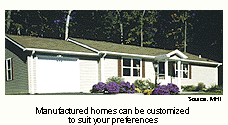|
Bringing home a house
|
 |
May 9, 2000: 8:27 a.m. ET
Nail down some information before purchasing a manufactured home
By Staff Writer Rob Lenihan
|
NEW YORK (CNNfn) - There's no place like home -- and if you invest in a manufactured home you can put it any place you like.
OK, maybe not any place, but the manufactured home offers homebuyers an opportunity to take greater control over the home-building process and a chance to save money as well.
Manufactured homes are single-family houses constructed entirely in a controlled factory environment built under a federal building code administered by the U.S. Department of Housing and Urban Development (HUD).
The homes range in size from 900-to-2,500 square feet and can be customized to suit your preferences. Not including land, prices can range from about $15,000 to more than $100,000.
Richard J. Roll, president of the American Homeowners Association, said a manufactured home can be an excellent choice for a first or secondary home.
"They're not in trailer parks anymore," Roll said. "The quality of construction, workmanship and aesthetics is better than they've ever been."
 How popular are manufactured homes? Well, the Manufactured Housing Institute, a trade group that represents manufactured home builders, cites a 1996 study showing that about 19 million people live full-time in more than 8 million manufactured homes across the nation. How popular are manufactured homes? Well, the Manufactured Housing Institute, a trade group that represents manufactured home builders, cites a 1996 study showing that about 19 million people live full-time in more than 8 million manufactured homes across the nation.
You want features? A manufactured home can include custom cabinets, walk-in closets, wood-burning fireplaces and bathrooms with recessed tubs and whirlpools. On the outside, your choices include a gable front, bay window or pitched roof with shingles.
You may put your home on private property, a land-lease community designed for manufactured homes, or you may buy the home and the land together in a planned subdivision.
Top ten tips
The American Homeowners Association has tips for consumers interested in buying a manufactured home.
- Know the differences. A manufactured home is built in a factory and transported to your property for assembly and finishing. A site-built home is built where it will stand.
- Shop around. You don't want to rush into any major expense, including buying a manufactured home. Contact several retailers and make sure you're happy with the style and price.
- Get the best financing. Many lenders provide a range of financing plans for manufactured home buyers. Ask manufactured home retailers for referrals to local lenders and remember that some conventional long-term loan providers require homes be placed on approved foundations. Manufactured homes are eligible for government-insured loans from the Federal Housing Administration and the Veterans Administration.
- Make sure it's properly installed. Installation is usually included in the sales price, and all services related to installing your manufactured home should be listed separately in the sales agreement. The installer should adhere to the manufacturer's instructions and, if applicable, any state regulations.
 - Look for the label. Manufactured homes are built to the federal Manufactured Home Construction and Safety Standards -- better known as the HUD Code. Each transportable section displays a red certification label.
- Shop for a strong warranty. Once again, shop around. Find out what your warranty does not cover, who performs the warranty service, and how long it remains in effect. The manufacturer's warranty does not cover improper installation and maintenance, accidents, negligence, unauthorized repairs or normal wear and aging. And follow the manufacturer's recommended maintenance schedule. Failure to do this could void your warranty.
- Chose a home site carefully. If you plan to buy land, check out all the local zoning laws and restrictive covenants before you buy. Contact the local public utility about availability of water, electric, gas or sewer connections and their costs. Make sure the site is properly prepared and that water drains away from the foundation before you install your home. Clear away rocks, trees or branches that could impede the transporter or damage your home.
- Inspect before you move in. You should perform a careful inspection of both the exterior and the interior. Consider hiring a professional home inspection service to identify any problems associated with construction, installation or operation of the home's systems.
- Think twice about moving your home. While it is possible to move your manufactured home, it can be expensive and potentially damaging to your home. If you do decide to relocate, check with the proper authorities about state transportation rules and local zoning requirements. In addition to transportation costs, you will have to pay for a new foundation, installation and utility hook-up.
- Pursue complaints. Contact the retailer who sold you the home and thoroughly document your complaint. Follow up by mail with a written list of problems to the retailer, manufacturer and installer. Call to set-up a service appointment. If the problems aren't corrected in a reasonable amount of time, or if the company responsible refuses to correct them, contact the state agency that administers the Federal Manufactured Housing Program in your state. Contact HUD in Washington at 800-927-2891 for information about the agency in your state.

|
|
|
|
|
 |

|

